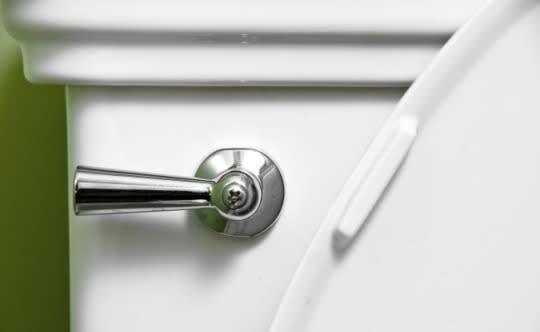What Happens If...You Sit On Pee?

(Photo: Getty Images)
The situation: You have to go really badly; you run into a public restroom, barely have time to lock the stall and unbutton your pants before plopping down on the toilet seat, which it turns out is covered with…someone else’s pee. (Find out if it’s bad to hold your pee.)
What you’re worried about: “I’m going to get crabs! Genital herpes! Chlamydia! HPV! Syphilis! AIDS!!!”
The very worst thing that could happen: The pee itself won’t do anything to you, even if you were to get it on your hands and transfer it to your face (ewwww), says microbiologist Philip M. Tierno, Jr., a professor of microbiology and pathology at NYU School of Medicine. That’s because urine usually doesn’t carry harmful microbes. Of course, touching bathroom surfaces that have been exposed to other people’s dirty hands can lead to you picking up a cold, influenza, stomach flu virus, or a staph or strep infection, Tierno says, “but that risk can be reduced or eliminated by properly washing your hands with soap and water after using the facilities,” he adds. (Want to pick up some healthier habits? Sign up to get daily healthy living tips delivered straight to your inbox!)
Related: 7 Things Your Poop Says About You
What will probably happen: Your butt might get wet. Seriously, you’re not going to catch any of the organisms listed above from urine. “The AIDS virus is contracted primarily via blood to blood or intimate sexual contact—not from urine,” Tierno says. Chlamydia in women remains deep inside the cervix—same goes for strains of HPV. The herpes virus lives inside cells and doesn’t survive for long outside the body, so that’s super-unlikely, per Tierno. Crabs and syphilis are transmitted via intimate sexual contact (crabs also lack “feet” designed to hold on to or walk on smooth surfaces such as toilet seats, per the CDC), and syphilis is of such low incidence in the general population that it’s essentially not a threat. (Here’s your guide to STDs when you are over 40.) And besides, all of these organisms are fragile and do not live outside a warm human host for very long. “Different microbes have different abilities for survival,” Tierno says. “Viruses die fastest, and some bacteria last minutes to hours.” So don’t bother putting down a layer of toilet paper—except to mop up a splash.
By Aviva Patz

 Yahoo News
Yahoo News 